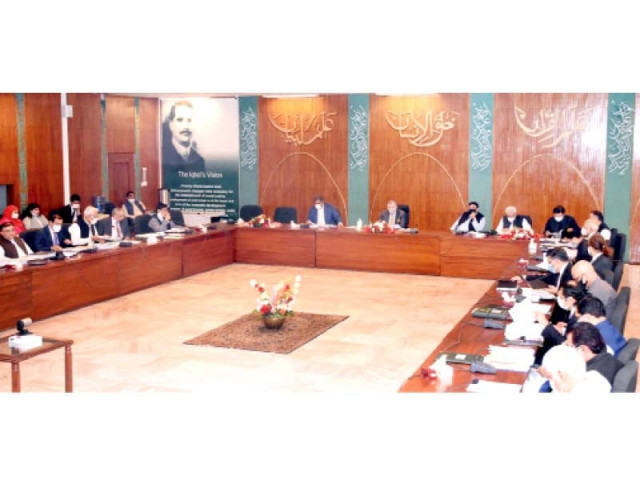ECC mulls action against K-Electric
Reviews possibility of takeover, suspension of additional power supplies

The Economic Coordination Committee (ECC) on Wednesday reviewed an option to take “considerable action” against K-Electric, including a possibility to take over the company and suspending additional power supplies due to its failure to meet commitments.
Headed by Federal Minister for Finance Shaukat Tarin, the ECC also approved payments of Rs90 billion to 35 independent power producers (IPPs) and gave Rs27.5 billion to the National Disaster Management Authority (NDMA) under prime minister’s Karachi package.
The power secretary gave a detailed briefing to the ECC regarding a draft summary for approval of arrangement for providing additional power from NTDC to K-Electric since April 2020, a finance ministry statement stated. The power secretary raised the issue of non-payment for the additional power supply by K-Electric to the Power Division. The disputed liabilities against K-Electric stand at Rs212 billion.
The ECC constituted a sub-committee comprising the federal minister for planning, federal minister for energy, federal minister for maritime affairs, special assistant to the PM on power and headed by the finance minister to negotiate with K-Electric for the settlement of payment dispute amicably, said the finance ministry.
“The K-Electric problem needs to be solved but the people of Karachi should not suffer because they cannot be blamed for the lack of enforcement of an agreement between the government and K-Electric,” said Planning Minister Asad Umar.
Sources said that the ECC discussed in detail the K-Electric issue and its implications for citizens of the country’s largest metropolitan city.
READ ECC waives up to 10% import duties
Interior Minister Sheikh Rashid Ahmed suggested that considerable action should be taken against the company, which was also endorsed by the ECC chairman, said the sources. They said that the meeting discussed whether the government, which also had a minority stake in the company, should take over K-Electric and suspend supplies of additional 350 megawatts of electricity.
Last year, the government had approved additional supply of 1,300MW from the national grid to K-Electric in June on the condition that the Central Power Purchasing Agency (CPPA) and National Transmission and Despatch Company (NTDC) will initial a tripartite power purchase agreement (PPA) for additional supply of 350 to 450MW within one week while keeping the financial settlement clauses in square brackets in the CPPA-G’s proposed language.
However, multiple meetings were held between K-Electric and CPPA to finalise the tripartite PPA for additional supply, but no agreement could be reached.
K-Electric is drawing an additional 350MW from the national grid in addition to 650MW to meet the emerging demand during the month of Ramazan.
It was discussed during the meeting that if the parties failed to reach an agreement by the end of meeting, an adverse action may be taken afterwards, said the sources.
The Musharraf government had privatised K-Electric, which is now seen as one of the worst privatisation cases. KES Power, which holds majority shares in K-Electric, wants to sell the stake to Shanghai Electric Power but the final deal has been pending for the last almost four years due to payment and PPA disputes between the government and K-Electric.
K-Electric desires payments to CPPA-G be adjusted against the subsidies to be provided by the government, which is not supported by the Power Division.
IPP payments
The Power Division presented a summary to the ECC regarding release of first instalment of Rs90 billion to the IPPs.
“The ECC approved the payment of first instalment to 35 IPPs out of a total of 47 whereas payment to the remaining 12 IPPs (under the Power Policy 2002) may be withheld owing to NAB investigation,” according to the finance ministry.
The Mohammad Ali committee has claimed that successive governments made Rs53 billion in excess payments to the power plants under the 2002 policy.
The National Accountability Bureau (NAB) has recently converted an inquiry into a power plant owned by Mian Mansha into investigation.
The government had entered into revised agreements with 47 IPPs and was supposed to pay the first instalment over a month ago, but it defaulted after the matter was taken up by NAB.
Out of Rs89.9 billion, Rs23.2 billion will go to Hubco power plant, Rs39.5 billion to Kapco plant, Rs6.7 billion to Rousch power plant, Rs1.8 billion to Fauji power plant, Rs6.5 billion to Pak Gen, Rs6.2 billion to Lalpir power plant, Rs2 billion to KEL and Rs719 million to SABP Power, all set up under the 1994 policy.
The 2006 policy power plants would get Rs4.2 billion in the first instalment, subject to clearance by the ECC.
IPPs have requested that the government and state institutions should fulfil their part of the bargain and ensure that the matter is pushed ahead without hurdles or unnecessary delays.
Offshore tax waiver
The ECC approved a reduction in tax liabilities of two Chinese companies that were working to construct hydropower projects in Azad Jammu & Kashmir (AJK).
The Power Division had placed a summary before the ECC regarding tax on payments to the offshore supply contractors of independent power producer(s) located in AJK. Now, these contractors will pay only 1% withholding tax, which will also be their final liability.
Other decisions
The ECC approved the retargeting of power subsidies, in principle, with a directive to work out modalities for future course of action.
The Power Division presented a summary to the committee regarding retargeting of power sector subsidies for electricity consumers during phase-I in consultation with Ehsaas and the Finance Division.
“I have cleared the summary in principle due to prior action by the World Bank for a loan but it will be duplication as the government is already working on a comprehensive plan under the Ehsaas programme,” said Tarin.
The Power Division had proposed that on behalf of power distribution companies, the National Electric Power Regulatory Authority (Nepra) may be requested for modifications in the distribution companies’ tariff determinations.
It has sought expansion in the definition of lifeline consumers to include residential non-Time of Use (ToU) consumers having a maximum in the last 12 and current month’s consumption of 100 units.
The two rates for 50 and 100 units will continue and a new category of protected customers (those consuming 200 kWh in a billing month and consistently 200 kWh for the past six months as per the mechanism) will be created.
Published in The Express Tribune, May 6th, 2021.
Like Business on Facebook, follow @TribuneBiz on Twitter to stay informed and join in the conversation.






1710175205-0/image-(9)1710175205-0-208x130.webp)












COMMENTS
Comments are moderated and generally will be posted if they are on-topic and not abusive.
For more information, please see our Comments FAQ